Paula Vince's Blog: The Vince Review, page 68
November 12, 2015
'The Shock of Night' by Patrick W. Carr

When one man is brutally murdered and the priest he works for mortally wounded on the streets of Bunard, Willet Dura is called to investigate. Yet the clues to the crime lead to contradictions and questions without answers. As Willet begins to question the dying priest, the man pulls Willet close and screams in a foreign tongue. Then he dies without another word.
Willet returns to the city, no closer to answers than before, but his senses are skewed. People he touches appear to have a subtle shift, a twist seen at the edge of his vision, and it's as though he can see their deepest thoughts. In a world divided between haves and have-nots, gifted and common, Willet soon learns he's been passed the rarest gift of all: a gift that's not supposed to exist.
Now Willet must pursue the murderer still on the loose in Bunard even as he's pulled into a much more dangerous and epic conflict that threatens not only his city, but his entire world--a conflict that will force him to come to terms with his own tortured past if he wants to survive.
MY THOUGHTS:
I was really keen to start Patrick W. Carr's new series since I raced through his Staff and the Sword trilogy, being among my favourite reads of 2014. I've discovered the Darkwater Saga has the same complex, unique and carefully plotted new land I would have expected from him. There are some differences, though.
We have an older, more experienced hero, for a start. Willet is more confident in the ways of the world than Errol was at the start of the other trilogy. He's already widely known for his combat skills, and is employed as a reeve by the king. As he tells his story in first person, it doesn't take long to realise that Willet, having fought in wars, suffers from PTSD and also the loss of a dream. He'd hoped to join the church, from which he is now barred owing to blood on his hands. He has his own personal terror. Several grisly murders occur on nights when he knows he's been sleepwalking, and returns to his room with blood on the hem of his robe.
It takes a fair bit of brain power and mental connection from the reader at first, to latch onto the way this new world works, making it feel more like hard work than a good read, but once we've got it, then we're off. I'm hoping this review will also serve as a bit of a guide to make things easier than I found them to start off with.
The religions are divided into four priestly orders or divisions, which roughly equate to Christian denominations. There is Servant, Vanguard, Absold and Merum, and Willet's personal leaning is the Merum order.
Most significant to the plot is the way in which humans are able to inherit gifts - which come in six categories; beauty, craft, sum, parts, helps and devotion. They can be split into more specific attributes such as musician, artist etc. While we normally think of gifts as being randomly passed down through a person's genes, it's far more intentional in this world. Heads of families are able to decide who to pass their gifts on to, through laying on of hands. Knowing that too many splits dilutes a gift is also a consideration, and the more pure are regarded as more powerful and desirable. If somebody dies without formally handing on their gift, it is regarded as 'free' or up for grabs, so to speak.
Although killing for a gift is a crime worthy of execution, murderers will still target those who are known to possess valuable, pure gifts, if they believe they can cover their tracks and get away with it.
In this story, Willet becomes the recipient of an extremely rare gift believed by some to be extinct, that of dema or demere. Perhaps it happened because he was the only one around at the time, but the dying priest Elwin confers it on him as his last act. Willet is henceforth able to deduce the hidden thoughts, motives and histories of a person's heart through mere physical touch, often accidental. That's when the intrigue thickens. As he's also known to be investigating Elwin's death, ruthless crooks are out to kill him.
I'd recommend reading the novella 'By Divine Right' before getting stuck straight into 'The Shock of Night' as it introduces some of the background, making things clearer for us.
Thanks to Net Galley and Bethany House for my review copy.
4 stars
Published on November 12, 2015 18:11
November 10, 2015
It humbles me to write this amazing blog post
You might have come across an article entitled, 'Literally now also means the same as figuratively'. As we were almost all taught in school, a literal meaning is the one which is actually true. But many modern people use the word to emphasise a statement and make their stories sound more impressive. (For example, 'I'm literally starving'.) Therefore, its informal meaning has now been added to English dictionaries, even though it means the opposite of the proper meaning it's held for centuries. So now I can say, 'My eyes literally popped out of my head when I read that article,' and nobody can say I'm wrong.
I understand that the evolution of languages over time is inevitable. If it stayed static, we might all be talking like Chaucer. Still, I can't help thinking it a shame to witness a change practically under my nose, which has clearly happened because of the ignorance of the general populance. So if enough uneducated people don't know what they're talking about, our language has to make a major shift to accommodate them? It could only happen with English, never with Maths. When I said something like that to my kids, they thought my attitude was a bit pompous. Whether or not that's true, I wonder what's next in store for English speakers.
I think I have a fair idea when I engage on social media and see people's use of the word 'humble.' I've noticed Facebook statuses like this over and over, not to mention published books.
'I felt humbled to win the netball grand final with such wonderful team members.'
'I was humbled to be awarded the grand prize for my highly acclaimed novel.'
'I felt so humbled to be included on a list with such illustrious members.'
'I felt so incredibly humbled to have my contribution selected over all others.'
Now, in your mind, take that word 'humbled' and replace it with 'honoured' or 'proud' in each of those examples. To me, it seems to make much more sense that way. Surely 'humbled' in its truest sense, means belittled, taken down in size, diminished. I can understand somebody writing, 'I feel humbled when I look up at the stars and the vast Milky Way in our huge night sky.' King David actually did write something like that long ago. It makes perfect sense that he should be aware of his own relative puniness in comparison to the galaxy. But to state that you feel humbled because you won a contest is completely different. I believe it's another word we see used far more often in the opposite sense of what it really means.
How did this happen? Maybe we've unconsciously decided that using it helps us appear like modest, self-effacing people. 'I don't want to come across as if I'm boasting, so if I throw in the word 'humble', everyone will see how unassuming I am.' It seems to be the fashionable term for those who want to do a bit of showing off without appearing that they are. In his book, The End of Me, Kyle Idleman has coined the term 'humblebrag' for what he notices people doing on social media. 'I'm so tired of men giving me wolf whistles' or 'I wish little Johnny would stop asking me questions I can't answer. After all, he isn't even four yet.' I wouldn't be surprised if any sentence beginning with, 'I was humbled...' may well fit into this category.
I can imagine the dictionary some day including an extra definition of 'humble'.
1. Modest and aware of one's failings.
2. Low in rank or importance.
3. To be humiliated or made to apologise.
4. To be the recipient of recognition or honour. Used to express pride in a noteworthy achievement (informal).
When that day comes, the poor non-English speakers who are trying to learn our weird, fluid language will have another reason to scratch their heads and say, 'Huh, I don't get it. How can it mean both?'
If you enjoy this blog post and can see my point, I'll be gratified and honoured, but if enough people tell me I'm talking a load of hogwash or having a silly rant, then I'll be humbled.
I understand that the evolution of languages over time is inevitable. If it stayed static, we might all be talking like Chaucer. Still, I can't help thinking it a shame to witness a change practically under my nose, which has clearly happened because of the ignorance of the general populance. So if enough uneducated people don't know what they're talking about, our language has to make a major shift to accommodate them? It could only happen with English, never with Maths. When I said something like that to my kids, they thought my attitude was a bit pompous. Whether or not that's true, I wonder what's next in store for English speakers.
I think I have a fair idea when I engage on social media and see people's use of the word 'humble.' I've noticed Facebook statuses like this over and over, not to mention published books.
'I felt humbled to win the netball grand final with such wonderful team members.'
'I was humbled to be awarded the grand prize for my highly acclaimed novel.'
'I felt so humbled to be included on a list with such illustrious members.'
'I felt so incredibly humbled to have my contribution selected over all others.'
Now, in your mind, take that word 'humbled' and replace it with 'honoured' or 'proud' in each of those examples. To me, it seems to make much more sense that way. Surely 'humbled' in its truest sense, means belittled, taken down in size, diminished. I can understand somebody writing, 'I feel humbled when I look up at the stars and the vast Milky Way in our huge night sky.' King David actually did write something like that long ago. It makes perfect sense that he should be aware of his own relative puniness in comparison to the galaxy. But to state that you feel humbled because you won a contest is completely different. I believe it's another word we see used far more often in the opposite sense of what it really means.
How did this happen? Maybe we've unconsciously decided that using it helps us appear like modest, self-effacing people. 'I don't want to come across as if I'm boasting, so if I throw in the word 'humble', everyone will see how unassuming I am.' It seems to be the fashionable term for those who want to do a bit of showing off without appearing that they are. In his book, The End of Me, Kyle Idleman has coined the term 'humblebrag' for what he notices people doing on social media. 'I'm so tired of men giving me wolf whistles' or 'I wish little Johnny would stop asking me questions I can't answer. After all, he isn't even four yet.' I wouldn't be surprised if any sentence beginning with, 'I was humbled...' may well fit into this category.
I can imagine the dictionary some day including an extra definition of 'humble'.
1. Modest and aware of one's failings.
2. Low in rank or importance.
3. To be humiliated or made to apologise.
4. To be the recipient of recognition or honour. Used to express pride in a noteworthy achievement (informal).
When that day comes, the poor non-English speakers who are trying to learn our weird, fluid language will have another reason to scratch their heads and say, 'Huh, I don't get it. How can it mean both?'
If you enjoy this blog post and can see my point, I'll be gratified and honoured, but if enough people tell me I'm talking a load of hogwash or having a silly rant, then I'll be humbled.
Published on November 10, 2015 09:30
November 8, 2015
'The Five Times I Met Myself' by James L Rubart

2015 Reading Challenge, Week 45 - A Book Set in the Future
Rather than choosing a book that takes place in a future year, I thought I'd go for this one instead, which fits the bill in a different way. This book is set in the future in that the hero gets a rare opportunity to receive advise from his future self. Whether or not it turns out to be a good thing, he does impact his future by returning to his past.
* * *
What if you met your twenty-three year old self in a dream? What would you say?
Brock Matthews' once promising life is unraveling. His coffee company. His marriage.
So when he discovers his vivid dreams—where he encounters his younger self—might let him change his past mistakes, he jumps at the chance. The results are astonishing, but also disturbing.
Because getting what Brock wants most in the world will force him to give up the one thing he doesn't know how to let go of . . . and his greatest fear is it's already too late.
MY THOUGHTS:
In this mind-bending novel, we not only get to witness the hero's life, but several alternative lives he might have lived, had he made different choices.
I've often thought, 'If only I got the chance to meet my younger self, there's so much I'd tell her.' I assume many of us feel the same, which is why I was eager to get stuck into this story of Brock Matthews, who got the chance to meet his younger self several times. He assumed it would be a golden opportunity to fix a few things which went haywire. However, his excellent intentions turned out to make many aspects of his life worse than they were before he started meddling with time.
At the start, Brock and his brother, Ron, are in charge of Black Fedora, the coffee company they inherited from their father. Brock is the 'face' of the company and works with the coffee blends, while Ron manages the business side and owns 51% of the shares. When a financial disaster looms, Brock wonders if there's any way he could have personally prevented it. Meanwhile, his marriage is getting shaky, as his wife, Karissa, begins to mull over their years together with dissatisfaction, and their son, Tyson, may no longer be able to attend college. That's the backdrop that makes Brock wonder if he could possibly convince his former self to prevent the train wreck his life became.
Are any of us really wise enough to assume we can advise our younger selves what to do? That was one of the big questions I came to ask myself. Brock was certain that at the age of 52, and with the advantage of hindsight, his 24-year-old self needed to listen to him. He was urgent in his mission to change his younger self's mind about the choices he faced. Yet after all that wheedling and convincing, the advice which seemed so wise, turned out to be questionable anyway. Only God has a God's eye view of any individual's life, no matter how often we've experienced life's hard knocks. Brock, to me, is proof that we never reach an age in which we know everything.
I found it shocking, and quite scary when you think about it, that Brock's choices turned out to drastically affect not only his own life but those closest to him, especially Karissa, Tyson and Ron. We may prefer to think that each individual is ultimately responsible for himself or herself, regardless of the positive or negative influence of others, but this story shows more of a strong ripple effect. Without going as far as saying they were putty in Brock's hands, I think the influence he had over the shaping of several destinies ended up alarming him. It makes the reader think about the way we treat our own spouses, children and siblings.
I love Brock's eventual epiphanies regarding the idols he'd set up in his life, especially his personal success in the business arena. There was nothing intrinsically wrong with Black Fedora, or striving to create a good product. It was Brock's lifelong attitude that got things all twisted; one which we could so easily buy into when it comes to our own lives.
One scene I found most touching was the flashback to an event which occurred when he was only 11 years old. It set the scene for a lot of misunderstanding, but I can easily picture my own sons doing the exact same thing. Unexpected gruffness from adults can devastate kids, and it's good that this was brought out.
I'll finish with one of the decisions Brock came to make. 'The future does not exist, so I will live for now. The past is gone and cannot be retrieved, so I will live now. There is only the present.'
Thanks to Thomas Nelson and NetGalley for my review copy.
4.5 stars
Published on November 08, 2015 14:45
November 5, 2015
'The Bronte Plot' by Katherine Reay

Lucy Alling makes a living selling rare books, often taking suspicious measures to reach her goals. When her unorthodox methods are discovered, Lucy's secret ruins her relationship with her boss and her boyfriend James—leaving Lucy in a heap of hurt, and trouble. Something has to change; she has to change.
In a sudden turn of events, James's wealthy grandmother Helen hires Lucy as a consultant for a London literary and antiques excursion. Lucy reluctantly agrees and soon discovers Helen holds secrets of her own. In fact, Helen understands Lucy's predicament better than anyone else.
As the two travel across England, Lucy benefits from Helen's wisdom, as Helen confronts the ghosts of her own past. Everything comes to a head at Haworth, home of the Brontë sisters, where Lucy is reminded of the sisters' beloved heroines, who, with tenacity and resolution, endured—even in the midst of change.
Now Lucy must go back into her past in order to move forward. And while it may hold mistakes and regrets, she will prevail—if only she can step into the life that's been waiting for her all along.
MY THOUGHTS:
The title could be misleading to some, but it's very apt. If you expect a fast-moving mystery, or something with a detective twist, this isn't really it. The truth turns out to be more creative, and maybe even more meaningful. It simply dawns on the heroine, Lucy, that some of the patterns of her own life gel with the way the Bronte sisters crafted the plots of their novels, and that there are aspects of their stories she can keep in mind to go about fixing hers.
The plot itself chugs along, but not always quickly. Lucy Alling works for antique dealer and interior designer, Sid McKenna. He's a great employer, but some of her own dishonest business habits have caught up with her. Aware of this, her estranged boyfriend's ailing grandmother still hires her as a private consultant and companion to travel to England, to hopefully help repair an old mistake of her own.
I felt a fair bit of the story focuses on the intricacies of Lucy's profession to a depth that tends to halt the action at times. When they finally get to the Haworth section, a major chunk of the novel describes characters doing home design renos. I was anxious to move on to the Bronte Museum and the moors, but that designing part which seemed drawn out, turns out to have a major impact on Lucy's decision making. Maybe other readers will find it perfect after all. I just wanted to get back to the scenery and literary themes.
Some conversation patches seemed a bit mundane, cheesy or repetitive. How often does Lucy have to ask Helen whether she thinks they should pack up and go home? I'm sure it would have happened like that, but for a novel, I think we get the idea with just a couple of mentions.
For some time, I wasn't sure how to feel about Lucy. I thought if she was really remorseful about her dodgy actions, she'd stop doing anything remotely dishonest, including her fake acts to get seats at restaurants. But old habits die hard and she just hadn't got to her real turning point, which happens near the end. Nobody can deny the significance and impact her own personal discovery finally has on her. The proof of the pudding is whether or not people make changes, and Lucy definitely does at last.
There were some interesting points to consider, such as the three generations of con-artists in her family, and the way each reasoned why their dishonest habits were not, in fact, so bad, and meant to make people happy rather than angry or sad. This gets characters and readers alike pondering where to draw the line when it comes to blurring fiction and reality.
My favourite parts were definitely when Lucy and Helen were exploring literary landmarks and talking about the lives of famous authors. I went on a holiday like that myself, when I was a bit younger than Lucy, and it brought back wonderful memories. It felt as if I was re-visiting and catching up with modern changes. No more pigeons in Trafalgar Square! That's a bit sad.
So altogether, although this wasn't quite the book I expected, it wasn't a bad book at all. I definitely learned a bit about fabrics and curios, although that hadn't been my intention.
Thanks to Thomas Nelson and NetGalley for my review copy.
3 stars.
Published on November 05, 2015 18:39
November 3, 2015
Six True Heroes
The traditional view put forward of a perfect hero may be a buff and rugged guy with superpowers, excessive strength or athleticism, or determination to avenge a vendetta. Yet they've never been the sorts of heroes I prefer. I think true heroism is more low-key and lovable by far. It can often call for simple speech or actions, which may be harder to pull off than all the brute strength in the world. The attitudes of the true hero often involve an element of self-effacement, resulting from a storehouse of deep love for others, which combine to make the hero willing to sacrifice anything, even his own life on some occasions.
The six characters I've chosen for examples are mostly from well-known and celebrated stories. Even though they all happen to be male, I know several awesome female characters also fit the bill. I might make a separate blog post for them some time. But for now, here are six true male heroes.
1) Gilbert Blythe
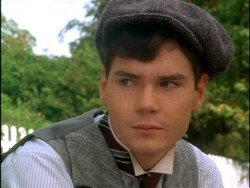
Soon after Matthew Cuthbert's death, he quietly relinquished the offer he'd received to teach at Avonlea School, choosing White Sands instead, which was further away and less convenient. His only reason was so that Anne could teach at the Avonlea School instead, which would enable her to stay close to Marilla in their time of need. He made no fanfares or announcements. In fact, he assumed that since her opinion of him had always been rock bottom, she might reject the offer if she knew. Anne ended up finding out through the grapevine, and Gilbert's generous gesture inspired her to make peace with him, after years of animosity.
2) Atticus Finch
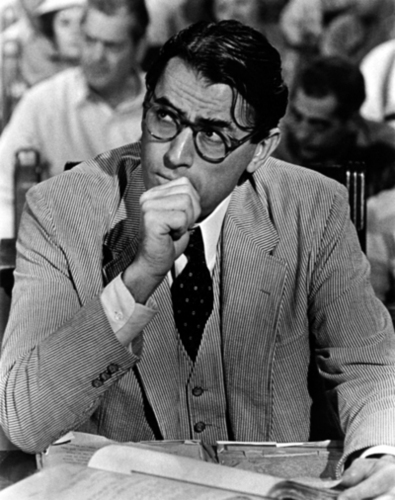
Who could forget the way his two children found out their daddy had once been the best shot in Maycomb County? He simply killed a dangerous, rabid dog, when the sheriff insisted he was the best person to do it. In the preceding years, he'd never even mentioned his impressive skill, and that made a greater impression on Jem and Scout than if he had. It's what we'd come to expect from the lawyer who would agree to stand for the truth and defend a man whose case was doomed from the start.
3) Shasta
The young hero from 'The Horse and his Boy' instinctively tried to protect the heroine, Aravis, who had always treated him with a haughty attitude. Mistaking Aslan for a fierce, wild lion who was about to tear her to pieces, Shasta slid from his horse's back to shoo him away, although to all appearances, he didn't have a chance. His brave action helped change Aravis' opinion of him.
4) Richard Dudgeon
He's the self-proclaimed devil's disciple, from the play by George Bernard Shaw. Despite his rebellious talk, when it came to laying his own life on the line to protect another, he didn't hesitate. He believed that the other man had a greater reason to live than himself.
5) Albus Dumbledore
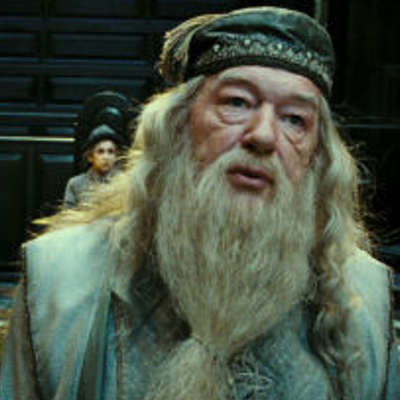
The Hogwarts Headmaster had many memorable moments, but I'm thinking particularly of his actions directly before his death scene on the astronomy tower. To the very end, he was trying to help and protect his beloved students. He immobilised Harry so that he wouldn't rush in to get himself involved. And he took the time to help Draco Malfoy face the fact that he wasn't the ruthless killer his father and the death eaters had trained him to be. What a great sacrifice, from an old wizard in extreme pain, who'd just been through an horrific ordeal. It's one of my favourite moments of The Half Blood Prince. 'My dear boy, let us have no more pretense. If you were going to kill me, you would have done it when you first disarmed me. We wouldn't be having this pleasant chat about ways and means... You are not a killer.'
6) Harry Potter

The 'boy who lived' pulled off many feats of physical mastery and daring, often just scraping through, but I've no doubt his finest moment was right at the end of The Deathly Hallows, when it dawned on him that he was the horcrux Voldemort never meant to make. Harry reached the conclusion that all of his previous adventures had been leading to this moment, and he had no other choice but to face Voldemort, knowing that only his own death would defeat the evil villain. As soon as that dawned on him, he didn't hesitate. You don't get much more heroic than that!
So there are just six of my picks. I've read several more, which I'm sure you have too. If you'd like to suggest any others we might like to read, please do so in the comments.
The six characters I've chosen for examples are mostly from well-known and celebrated stories. Even though they all happen to be male, I know several awesome female characters also fit the bill. I might make a separate blog post for them some time. But for now, here are six true male heroes.
Warning - Even though most of these are well known stories which I'd assume most of us are familiar with, my reflections are riddled with spoilers. If you haven't read them and would like to, you might prefer to skim over what comes below.
1) Gilbert Blythe

Soon after Matthew Cuthbert's death, he quietly relinquished the offer he'd received to teach at Avonlea School, choosing White Sands instead, which was further away and less convenient. His only reason was so that Anne could teach at the Avonlea School instead, which would enable her to stay close to Marilla in their time of need. He made no fanfares or announcements. In fact, he assumed that since her opinion of him had always been rock bottom, she might reject the offer if she knew. Anne ended up finding out through the grapevine, and Gilbert's generous gesture inspired her to make peace with him, after years of animosity.
2) Atticus Finch

Who could forget the way his two children found out their daddy had once been the best shot in Maycomb County? He simply killed a dangerous, rabid dog, when the sheriff insisted he was the best person to do it. In the preceding years, he'd never even mentioned his impressive skill, and that made a greater impression on Jem and Scout than if he had. It's what we'd come to expect from the lawyer who would agree to stand for the truth and defend a man whose case was doomed from the start.
3) Shasta
The young hero from 'The Horse and his Boy' instinctively tried to protect the heroine, Aravis, who had always treated him with a haughty attitude. Mistaking Aslan for a fierce, wild lion who was about to tear her to pieces, Shasta slid from his horse's back to shoo him away, although to all appearances, he didn't have a chance. His brave action helped change Aravis' opinion of him.
4) Richard Dudgeon
He's the self-proclaimed devil's disciple, from the play by George Bernard Shaw. Despite his rebellious talk, when it came to laying his own life on the line to protect another, he didn't hesitate. He believed that the other man had a greater reason to live than himself.
5) Albus Dumbledore

The Hogwarts Headmaster had many memorable moments, but I'm thinking particularly of his actions directly before his death scene on the astronomy tower. To the very end, he was trying to help and protect his beloved students. He immobilised Harry so that he wouldn't rush in to get himself involved. And he took the time to help Draco Malfoy face the fact that he wasn't the ruthless killer his father and the death eaters had trained him to be. What a great sacrifice, from an old wizard in extreme pain, who'd just been through an horrific ordeal. It's one of my favourite moments of The Half Blood Prince. 'My dear boy, let us have no more pretense. If you were going to kill me, you would have done it when you first disarmed me. We wouldn't be having this pleasant chat about ways and means... You are not a killer.'
6) Harry Potter

The 'boy who lived' pulled off many feats of physical mastery and daring, often just scraping through, but I've no doubt his finest moment was right at the end of The Deathly Hallows, when it dawned on him that he was the horcrux Voldemort never meant to make. Harry reached the conclusion that all of his previous adventures had been leading to this moment, and he had no other choice but to face Voldemort, knowing that only his own death would defeat the evil villain. As soon as that dawned on him, he didn't hesitate. You don't get much more heroic than that!
So there are just six of my picks. I've read several more, which I'm sure you have too. If you'd like to suggest any others we might like to read, please do so in the comments.
Published on November 03, 2015 15:43
November 1, 2015
'Two Steps Forward' by Sharon Garlough Brown
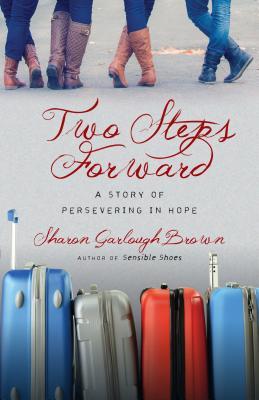
2015 Reading Challenge, Week 44 - A Book with a number in the title.
I was delighted to receive a copy of this book in the post, all the way from the USA. Its prequel, Sensible Shoes, was one of my favourite reads for 2014, and I knew this one would be just as good.
The women from Sensible Shoes are taking their next steps in the spiritual formation journey. But each of them is finding roadblocks along the way. Meg, a widow and recent empty-nester, is off to see her daughter in London. But what does hope look like when nothing goes as planned? Charissa, a conscientious graduate student, is battling to let go of control and embrace her unexpected pregnancy. But what does hope look like when transformation is slow? Hannah, a pastor on sabbatical, is trying to find her equilibrium with rest and a new relationship. But what does hope look like when old grief keeps resurfacing? Mara, a wife and mother, longs for her difficult family life to improve. But what does hope look like when tension escalates and circumstances only get worse? Sometimes life feels like two steps forward and one step back. Find your own spiritual journey reflected in the lives of these women and discover the way forward.
MY THOUGHTS:
The first book in this series, Sensible Shoes, was one of my favourite books of 2014, and this picks up where that one left off. The four main characters are so different from each other, once again I was amazed by how easy it was to relate to each one of them. I especially like the tension between how they think they should behave and whether it's the response their heart tells them is right. These are definitely Christian novels, with God's subtle workings in the hearts of individuals at their own heart.
Christians are often counselled to put others' preferences ahead of their own, and Meg is a natural at that, but how is it meant to play out when you're chafing inside? When you know the other person will resent you for speaking up, but you can't sweep aside your point of view this time, especially when it's a person you care deeply for?
Christians are told that we should be Jesus' hands and feet, which would seem especially the case for a pastor like Hannah, but when is a line crossed into self-appointing yourself as God's rep or deputy? I like her revelation, 'My words declared Jesus was Lord but my life declared I was.' And also her paradigm shift that she'd been putting all of her confidence into her ability to hear from God, instead of his ability to speak to her in a way she'd recognise and understand. What a big potential stress relief for many of us.
It's great to see Mara, the under-appreciated mother with her history of rejection, learn to keep soaking in the truth that no matter whether or not her outer experiences reflect it, she is beloved! We are all beloved. What a simple, but revolutionary truth to remember each morning. How great is her relationship with her son, Jeremy! For a little while, I was concerned that she was showing favouritism, but no, her interactions with Kevin in this story show that's not the case.
Then there's Charissa. What hope is there for a control freak who even wants to control how she's going to give up control? She asks that question herself. Her's is a wake-up call for those times when we want to separate our sense of self from our achievements and reputations. Her story helps us step back to question our motives when we ask, 'Why am I working so hard on this project anyway?'
I like the chance to probe the deeper questions these ladies' stories raise. They may even be different for each of us. For me, one of them was 'to what extent should we accept our knee-jerk reactions as part of our natural make-up, and to what extent should we desire to temper and change them?' It would seem the experiences of the four main characters bear out my own; it's a bit of both. Even though mentally beating ourselves up for our perceived shortcomings does no good whatsoever, if an ingrained reaction is holding us back, it's possible, with God's help, to work on overlaying it with new attitudes.
While some of the particular episodes in this story are neatly wrapped up, it's easy to see that the wider issues are still unfolding, making me hope for a third book.
Thanks to the author, and the publisher, InterVarsity Press, for providing a review copy.
5 stars
Published on November 01, 2015 14:23
October 25, 2015
'Crazy Stories, Sane God' by John Alan Turner
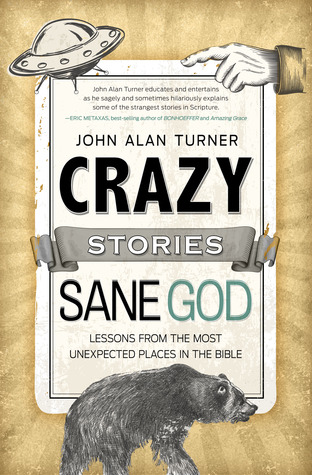
2015 Reading Challenge, Week 43 - A Book with Antonyms in the title.
I searched through my kindle and discovered this one, which fits the bill.
* * *
You probably know a lot of Bible stories: Joseph and his coat, David and Goliath, Daniel and the lions, Jesus walking on water. These get mentioned everywhere from popular literature to your local church.
But there are other stories in the Bible that preachers and Sunday school teachers tend to skip over because . . . well . . . because they seem crazy and mad; the kind of stories that make us change the subject quickly when children bring them up, because we don't know why they are in the Bible or what they could possibly mean.
In Crazy Stories, Sane God popular author and teacher John Alan Turner takes us on a wild and unpredictable ride through the weirdest and least familiar stories in the Bible. Through it all, Turner shows us how even these odd episodes reveal important things about the character and nature of God and, consequently, what they mean for us today.
MY THOUGHTS:
This book is full of entertaining and well-written summaries of Bible stories from someone who seems to be a natural comedian. For example, the author suggests that Abraham must have felt ripped off (he says no pun was intended) when God gave him the covenant of circumcision, because he knew Noah got a rainbow. What it doesn't contain is much help making sense of some of the curly incidents many of us have no doubt wondered about.
Here's a handful of the questions the book claims to address? Why would Noah curse his grandson, Canaan, who apparently had nothing to do with Ham's gesture of disrespect? Why would Elisha call down a curse causing teenage boys to mauled by bears, simply for making fun of his bald head? Why would Lot protect the strangers beneath his roof by offering to sacrifice his own daughters to the evil, lecherous crowd of Sodom? (That one always made my skin crawl.) Why would Jesus allow the demons he'd exorcised to enter a herd of pigs, and ruin a man's livelihood, rather than simply sending them off into the ether? Why would God choose to kill Ananias and Sapphira outright, rather than giving them a stern warning? And what about that weird passage near the start of Exodus about the 'bridegroom of blood' when Zipporah apparently saves Moses' life from God's wrath by circumcising their sons by hand?
Turner's responses seem to fall among the following.
a) God's ways are beyond our comprehension, so just trust Him.
b) Maybe we're asking the wrong question.
c) Maybe we're not supposed to know.
d) If the people involved had behaved better, it wouldn't have happened to them.
These four responses may indeed be our only human recourse, but then why set yourself up for criticism by writing a book with a title and blurb that suggests you're going to attempt to provide more complex and threshed out answers? Overall, it provided some laughs but seemed fairly shallow and didn't really satisfy the interest it stirred in me.
2.5 stars
Published on October 25, 2015 14:01
October 21, 2015
'Bandersnatch' by Erika Morrison
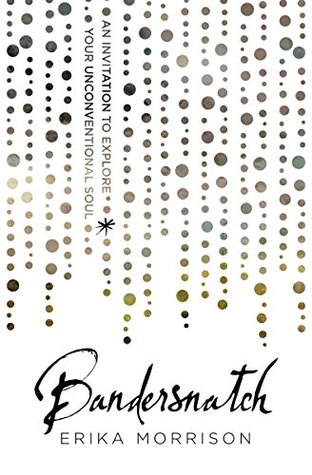
Contemporary Christianity seems to be suffering from an epidemic of sameness. Uniformity. Monotony. Those trapped inside are often afraid to step beyond established norms and express their creativity, and those on the outside often see little that attracts them. Yet God, out of the abundance of his own creative force, made each one of us unique. Peculiar. Irreplaceable. So why so much pressure to conform?
Bandersnatch* explores this intersection of disillusionment by inviting readers on a journey of liberation. It’sorganized around four creative terms viewed through the life of Jesus: Avant-Garde, Alchemy, Anthropology, and Art. Each expression reveals a diverse facet of God’s unorthodox creativity planted within us.
Providing a fresh look at God’s avant-garde nature and a new set of definitions by which to live, Erika Morrison gives us permission to break free from the expectations and labels that cramp our souls. Only in embracing our uniqueness can we create artful, holistic lives that matter to both heaven and earth.
*A bandersnatch, while more commonly known as the wild, ferocious, and mythical creature of Lewis Carroll’s creation, is also a person with unconventional habits and attitudes.
MY THOUGHTS:
I'm more familiar with the jaberwocky, but another mythical creature introduced by Lewis Carroll is the bandersnatch. It's a fairly wild creature with unconventional habits, and in this book we're invited to embrace our inner bandersnatches, figuring out who we are deep down rather than just going with society's flow and fitting in.
'Human made systems are taking up space where our identities should be blooming,' Erika Morrison declares. She urges us to examine every box we've ever accepted without question, looking at the beliefs, rules, formulas and assumptions that fuel them.
She discusses a system she calls 'crossing over' in which words, ideas and values which have been typecast by the world are given new, more fitting definitions. For example, the world may think the word 'blessed' equates to wealth and popularity, but when Jesus used it, he meant that a person had come to a point when they realise they really have nothing but him. She focuses on four 'A' words or terms in particular; Avant Garde, Alchemy, Anthropology and Art. I really like her take on 'alchemy.' The world would have us believe it means turning something of base value into something more showy and expensive, but to Morrison, real alchemy is simply noticing the treasures in what is generally passed by as unnoticeable. And to her, the word 'art' encompasses any of the 1000 ways a person might reveal themselves to the world.
She and her homeschooling family carry out these principles in a really hardcore way which I find extremely challenging. Certainly nobody could ever accuse Erika Morrison of not practicing what she preaches. The extreme lengths they take to clean up their city and show their love to others convince me I'd have to be a bandersnatch in a far more low key way. However, as I read, I can't help wondering whether the Morrisons are doing just what Jesus might do if he showed up in the twenty-first century. It's not a book that leaves me feeling completely comfortable, which might show that her intention is working. Then suddenly, the reader is off the hook, when she says that following her example to the letter is the last thing she'd want to tell us to do. A good combination of conviction and grace.
I'm sure I'll delve into it from time to time when I need a shake-up. I can't help wondering what might come next. Some of the passages are so beautiful, I've copied them down to ponder, but they're too long for the scope of this review. Even the author states that she's only half as weird as she longs to be, but her quotes all through make a paradoxical sort of sense.
Why would we want to define our 'thisness' by somebody else's 'thatness' indeed?
Thanks to Thomas Nelson and NetGalley for my review copy.
4 stars
Published on October 21, 2015 18:04
October 20, 2015
Books with Cool Literary Cats
I've always found cats to be mystical and bewitching. So have others, judging by all the legends about black ones riding on the backs of witches' brooms. They are among the most mysterious and other-worldly of domestic pets.
Maybe it's their aloof manner of prancing so lightly on their velvet paws, which never make a sound when they touch the ground. Or their eyes, which light up the night like exotic gems, especially when caught in car headlights. It could be their way of turning warrior when they fight, with howls that could raise the dead. Or the rumbles of their purrs, like a mysterious inner motor no other creature seems to have. Perhaps it's partly the roughness of their tongues, enabling them to complete their fastidious grooming without needing the indignity of a bath. Of course, their acrobatic way of falling on their feet, even from great heights, fuels an intriguing myth that they have nine lives. All of the above makes me wonder if it's true that they simply allow us to refer to them as our pets, while they think they know better. I saw a funny facebook post recently, in which a dog says, 'These people feed me and care for me, they must be gods,' and then a cat says, 'These people feed me and care for me, I must be a god.'
My son and I often go for night walks around our district, and the drawcard for him is a group of cats which spring over to us, greeting us with meows. Two of them are black as the night. It's really not a good thing to have so many cats next door to the Wetlands, our bird-watchers' haven, but that's one of life's ironies. Even though I don't really approve either, I still stop to pat them, seduced by their mystique as usual.
Here are my top picks for cat lovers. (I'm not including majestic, large cats like Aslan, Richard Parker and Shere Khan, who probably deserve a post of their own.) Together, this lot embodies many of the features which intrigue us about cats. Here they are, counting down from ten to one.
10) Garfield.
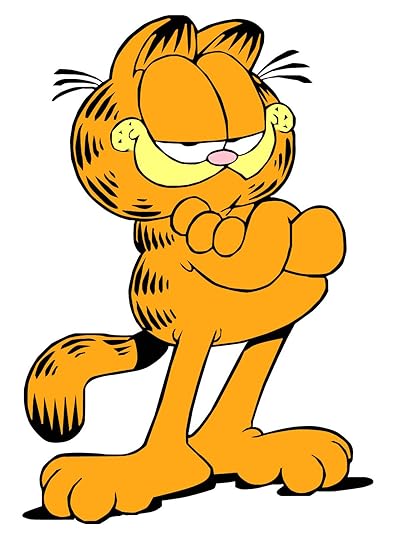
He's so fat, lazy and sarcastic. And he knows he's smart enough to manipulate not just Odie, the exuberant and simple-minded dog, but also Jon, their owner.
9) Cat in the Hat.
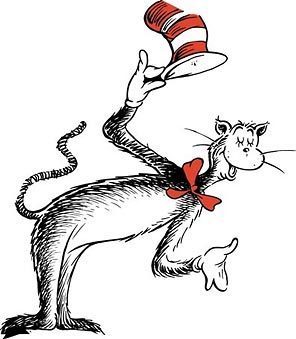
He does exactly as he pleases, sauntering in when he knows the children's mother is out, to wreak havoc in their house. And he does it all with such an insouciant, 'She'll be right' attitude, knowing he has everything under control, despite the neurotic goldfish's opinion. Nobody can accuse this cat of needing chill pills.
8) The Cheshire Cat.
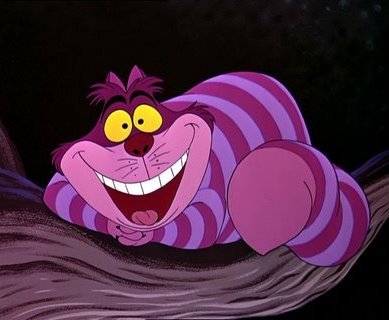
He has plenty of sauciness and wisdom to match that wide, crescent shaped grin spread across his face. He fits well in Wonderland with the other characters Alice comes across. I remember driving through the town of Cheshire with my parents when I was younger, and it's filled with grinning, stone cats.
7) Dick Whittington's cat.

This one belongs in a old English legend which is based on truth. The desperate servant boy bought her for a penny, to stop rats and mice scurrying over his face at night. She proves her worth for the boy, and later a ship's crew and African king's court. She's always equal to the challenge of stopping rat plagues single-handedly (or single-pawedly), not to mention the theme that giving up his most treasured possession resulted in untold glory for young Richard.
6) Puss in Boots.

The naive and simple young hero, the Marquis of Carabbas, would never have gone far on his own wits, but luckily for him, his loving cat takes it upon himself to look after his young master's future. Puss' plans involve all sorts of far-sightedness and trickery. The young man agrees to simply trust him and go along with it all, no matter how weird and counter-productive it sounds. And Puss brings him through every time.
5) Khat
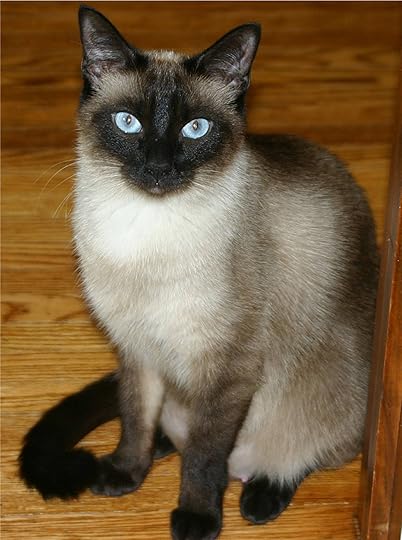
This wily character is from Midnite by Randolph Stow. Following the tradition of cats taking it upon themselves to look after their orphaned and bankrupt young masters, I guess this is our Australian colonial offering. Khat is the brains of the outfit, setting himself up as the young bushranger's tough Siamese confederate. He's a ruthless crook, but as he's articulate and astute, Khat pulls them through on a number of occasions.
4) Hamish.
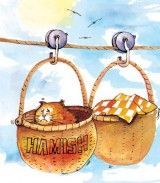
He belongs in 'The Lighthouse Keeper's Lunch.' As the seagulls keep stealing from the delicious basket which the lighthouse keeper's wife sends on the line across the water, they decide Hamish can guard the food. Needless to say, he's not impressed by the hair-raising ride and they can't force him to repeat it, however much they want to.
3) Mrs Norris.
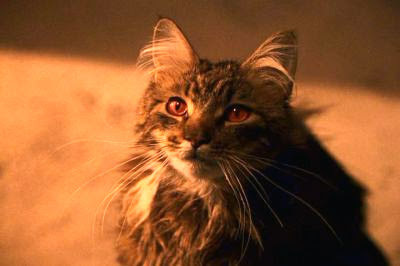
She's from the Harry Potter series. Mrs Norris is owned by Argus Filch, the grouchy caretaker. The Hogwarts students dread the sight of her, because they know she's a trouble-maker and a spy. Whenever she sneaks up behind them, it's a sign that her owner is never far behind.
2) Crookshanks.
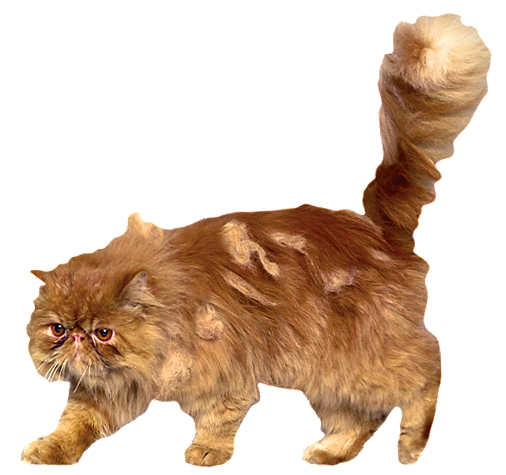
Another Harry Potter cat, he belongs to Hermione. Crookshanks is one of the few creatures who senses something untrustworthy about Ron's rat, Scabbers. A cowardly criminal is on the loose, but his escape is no fault of Crookshanks, who does his best to pounce on him at every opportunity. And Sirius Black calls him one of the smartest of his kind he's ever come across.
1) The Cat from Coraline.
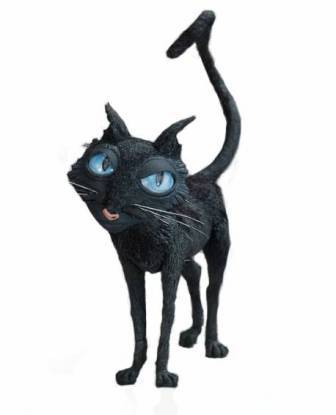
He's too arrogant to bother with a name, because names are for commoners. ('But what if someone wants to call you inside for dinner?'...'Then they can simply call "Dinner!"') As the rats are clearly evil minions of the villainess, he's being a good guy when he takes every opportunity to thin them out by ripping their heads off. He's able to move freely between the two realms of the old house, no matter how hard the evil mother tries to stop him, so whenever he's near Coraline, she knows she's not quite as friendless as she feels.
There's my round-up. Looking down the list, it's interesting to note that some of them come from really old tales, which make them heroes simply for killing the rats which carry the plague, or as we now know, kill the rats which carried the fleas which carried the plague. If you can think of any extra cool literary cats to add to my collection, please tell us in the comments.
Maybe it's their aloof manner of prancing so lightly on their velvet paws, which never make a sound when they touch the ground. Or their eyes, which light up the night like exotic gems, especially when caught in car headlights. It could be their way of turning warrior when they fight, with howls that could raise the dead. Or the rumbles of their purrs, like a mysterious inner motor no other creature seems to have. Perhaps it's partly the roughness of their tongues, enabling them to complete their fastidious grooming without needing the indignity of a bath. Of course, their acrobatic way of falling on their feet, even from great heights, fuels an intriguing myth that they have nine lives. All of the above makes me wonder if it's true that they simply allow us to refer to them as our pets, while they think they know better. I saw a funny facebook post recently, in which a dog says, 'These people feed me and care for me, they must be gods,' and then a cat says, 'These people feed me and care for me, I must be a god.'
My son and I often go for night walks around our district, and the drawcard for him is a group of cats which spring over to us, greeting us with meows. Two of them are black as the night. It's really not a good thing to have so many cats next door to the Wetlands, our bird-watchers' haven, but that's one of life's ironies. Even though I don't really approve either, I still stop to pat them, seduced by their mystique as usual.
Here are my top picks for cat lovers. (I'm not including majestic, large cats like Aslan, Richard Parker and Shere Khan, who probably deserve a post of their own.) Together, this lot embodies many of the features which intrigue us about cats. Here they are, counting down from ten to one.
10) Garfield.

He's so fat, lazy and sarcastic. And he knows he's smart enough to manipulate not just Odie, the exuberant and simple-minded dog, but also Jon, their owner.
9) Cat in the Hat.

He does exactly as he pleases, sauntering in when he knows the children's mother is out, to wreak havoc in their house. And he does it all with such an insouciant, 'She'll be right' attitude, knowing he has everything under control, despite the neurotic goldfish's opinion. Nobody can accuse this cat of needing chill pills.
8) The Cheshire Cat.

He has plenty of sauciness and wisdom to match that wide, crescent shaped grin spread across his face. He fits well in Wonderland with the other characters Alice comes across. I remember driving through the town of Cheshire with my parents when I was younger, and it's filled with grinning, stone cats.
7) Dick Whittington's cat.

This one belongs in a old English legend which is based on truth. The desperate servant boy bought her for a penny, to stop rats and mice scurrying over his face at night. She proves her worth for the boy, and later a ship's crew and African king's court. She's always equal to the challenge of stopping rat plagues single-handedly (or single-pawedly), not to mention the theme that giving up his most treasured possession resulted in untold glory for young Richard.
6) Puss in Boots.

The naive and simple young hero, the Marquis of Carabbas, would never have gone far on his own wits, but luckily for him, his loving cat takes it upon himself to look after his young master's future. Puss' plans involve all sorts of far-sightedness and trickery. The young man agrees to simply trust him and go along with it all, no matter how weird and counter-productive it sounds. And Puss brings him through every time.
5) Khat

This wily character is from Midnite by Randolph Stow. Following the tradition of cats taking it upon themselves to look after their orphaned and bankrupt young masters, I guess this is our Australian colonial offering. Khat is the brains of the outfit, setting himself up as the young bushranger's tough Siamese confederate. He's a ruthless crook, but as he's articulate and astute, Khat pulls them through on a number of occasions.
4) Hamish.

He belongs in 'The Lighthouse Keeper's Lunch.' As the seagulls keep stealing from the delicious basket which the lighthouse keeper's wife sends on the line across the water, they decide Hamish can guard the food. Needless to say, he's not impressed by the hair-raising ride and they can't force him to repeat it, however much they want to.
3) Mrs Norris.

She's from the Harry Potter series. Mrs Norris is owned by Argus Filch, the grouchy caretaker. The Hogwarts students dread the sight of her, because they know she's a trouble-maker and a spy. Whenever she sneaks up behind them, it's a sign that her owner is never far behind.
2) Crookshanks.

Another Harry Potter cat, he belongs to Hermione. Crookshanks is one of the few creatures who senses something untrustworthy about Ron's rat, Scabbers. A cowardly criminal is on the loose, but his escape is no fault of Crookshanks, who does his best to pounce on him at every opportunity. And Sirius Black calls him one of the smartest of his kind he's ever come across.
1) The Cat from Coraline.

He's too arrogant to bother with a name, because names are for commoners. ('But what if someone wants to call you inside for dinner?'...'Then they can simply call "Dinner!"') As the rats are clearly evil minions of the villainess, he's being a good guy when he takes every opportunity to thin them out by ripping their heads off. He's able to move freely between the two realms of the old house, no matter how hard the evil mother tries to stop him, so whenever he's near Coraline, she knows she's not quite as friendless as she feels.
There's my round-up. Looking down the list, it's interesting to note that some of them come from really old tales, which make them heroes simply for killing the rats which carry the plague, or as we now know, kill the rats which carried the fleas which carried the plague. If you can think of any extra cool literary cats to add to my collection, please tell us in the comments.
Published on October 20, 2015 09:00
October 18, 2015
'Madeline' by Ludwig Bemelmans
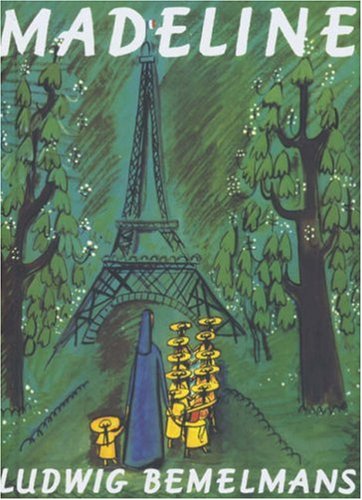
2015 Reading Challenge, Week 42 - A Book Based on or Turned into a TV Series.
It was nice to choose a short book for this week of the challenge. It brings back memories of watching the animated TV series with my little 1990s kids. I wish it was still on TV.
* * *
Madeline is one of the best-loved characters in children's literature. Set in picturesque Paris, this tale of a brave little girl's trip to the hospital was a Caldecott Honor Book in 1940 and has as much appeal today as it did then. The combination of a spirited heroine, timelessly appealing art, cheerful humor, and rhythmic text makes Madeline a perennial favorite with children of all ages.
MY THOUGHTS:
It's basically a big poem with simple, gorgeous illustrations. In the TV series, there is lots of happy singing. The setting is such a great place, it's never even referred to as a school, although it's easy to imagine that's what it must be. Since the girls receive parcels in the post from their families, it's definitely not an orphanage. It's only ever called, 'the old house in Paris all covered with vines', and the director/teacher Miss Clavell, never seems to need to discipline anyone.
Madeline is the smallest of all, and presented as the most fearless and original in just a few short lines. Part of her charm is her bright attitude, finding interesting things everywhere, even when they might seem dull and mundane to others. Without any effort, Madeline can make the other girls envy her appendicitis instead of pity her. Proudly showing off the scar on her tummy is enough.
Their genuine affection for each other is a hallmark of Miss Clavell's little girls. I remember how they used to chant, 'We love our bread, we love our butter, but most of all we love each other,' in the TV series. They regarded their neighbour, Pepito, as a nuisance until he showed that he does have feelings and became the sole boy in their adventures. He was just as picturesque, in his little tailored suits with lace collars and cuffs. The beloved dog Genevieve, who Madeline rescued from the river, was a faithful sidekick too.
Each story was always rounded off with, 'That's all there is, there isn't any more,' but we were always glad there would be, until one day when Madeline seemed to be taken off the air along with several other great kids' series from the 1990s. That's the topic of another blog post.
5 stars
Published on October 18, 2015 20:18
The Vince Review
Author, blogger, reader, reviewer, mother of three. All this goes under the mantle of 'stay at home mum'. I also love walking and cooking when the mood strikes me. Getting stuck into a good book has a
Author, blogger, reader, reviewer, mother of three. All this goes under the mantle of 'stay at home mum'. I also love walking and cooking when the mood strikes me. Getting stuck into a good book has always been one of the best things ever.
I invite you to treat this blog like a book-finder. People often ask the question, "What should I read next?" I've done it myself. I try to read widely, so hopefully you will find something that will strike a chord with you. The impressions that good books make deserve to be shared.
I read contemporary, historical and fantasy genres. You'll find plenty of Christian books, but also some good ones from the wider market. I also read a bit of non-fiction to fill that gap between fiction, when I don't want to get straight on with a new story as the characters of the last are still playing so vividly in my head. ...more
I invite you to treat this blog like a book-finder. People often ask the question, "What should I read next?" I've done it myself. I try to read widely, so hopefully you will find something that will strike a chord with you. The impressions that good books make deserve to be shared.
I read contemporary, historical and fantasy genres. You'll find plenty of Christian books, but also some good ones from the wider market. I also read a bit of non-fiction to fill that gap between fiction, when I don't want to get straight on with a new story as the characters of the last are still playing so vividly in my head. ...more
- Paula Vince's profile
- 108 followers



